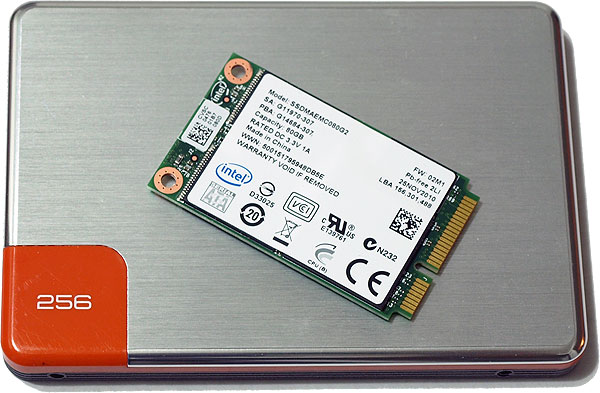Intel 310 Series 80GB mSATA SSD Review
Test System and HD Tune Pro


|
Motherboard - Video Card - Memory - Audio - Hard Drives -
|
Hardware Used: Intel Core i7 930 Asus P6X58D Premium (X58 Express Chipset) ATI Radeon HD 5850 6144MB Corsair DDR3-1333 CAS 7 Integrated on board Corsair Nova Series V128 128GB Intel X-25M Gen2 80GB Kingston SSDNow V Series 64GB OCZ Vertex 2 100GB Samsung 470 Series 256GB |
OS - Chipset Drivers - DirectX - Video Drivers - |
Relevant Software: Windows 7 Professional Intel 9.1.1.1020 w/ Matrix Storage DirectX 11 AMD Catalyst 10.10 Benchmarks Used: HD Tune Pro HD Tach v3.0.1.0 ATTO v2.46 CrystalDiskMark v3 PCMark Vantage SiSoftware Sandra 2010 SP1 |

|
The latest version of HD Tune Pro (v4.60) offers improved support for SSDs and we use it here to test both read and write performance broken up into minimum transfer rate, maximum transfer rate, average transfer rate, access time, burst rate, and CPU usage. What this does is a paint an overall picture of performance rather than zero in on just the average score. By doing so, we can see which drives might suffer from a stuttering problem or otherwise run inconsistently..


Intel said we could expect similar performance the X25-M, and that's exactly what our HD Tune Pro results bear out. Both the average read and write speed numbers fell in line with Intel's advertised specs, and the 310 SSD even managed to redline slightly above what it's supposed to be capable of. Not too shabby.
As expected, the X25-M turned in noticeably superior read speeds, though the gap wasn't quite as wide as the rated specs. The X25-M is rated at 250MB/s versus 200MB/s on the 310, however we only noted a 29MB/s difference in our HD Tune Pro run. We should also note that the 310 SSD turned in a comparable read score to that of OCZ's Vertex 2 100GB SSD, though OCZ pulled way ahead in write performance.






